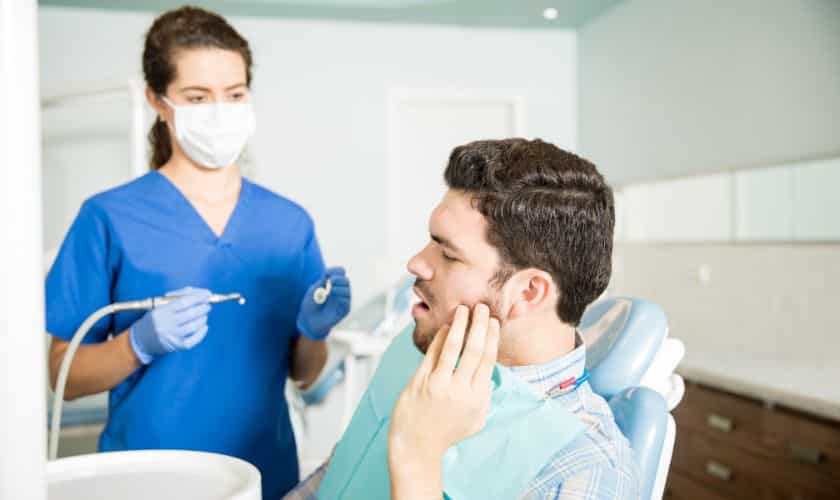Published on April 18, 2023

Dental emergencies can be a scary experience, but it’s important to stay calm and seek proper care. Whether you’re dealing with severe tooth pain, a broken crown or even a knocked-out tooth – don’t panic! In this blog post, we’ll provide you with essential tips on how to remain composed and handle the situation like a pro. So take a deep breath and let’s dive in!
What is a Dental Emergency?
A dental emergency is any situation that requires immediate attention from a dentist. Common dental emergencies include toothaches, cracked or broken teeth, lost fillings, and objects caught between teeth.
If you are experiencing a dental emergency, the first thing you should do is contact your dentist. If you are unable to reach your dentist right away, there are some steps you can take to manage the pain and keep the situation under control until you can get to a dentist.
For a toothache, rinse your mouth with warm water and use floss to remove any food that may be stuck between your teeth. You can also take over-the-counter pain medication to help relieve the discomfort. If you have a cracked or broken tooth, rinse your mouth with warm water and apply a cold compress to the outside of your face to reduce swelling. It is important not to put any pressure on the damaged tooth. If you have lost a filling, place a piece of sugarless gum in the empty space. If you have an object caught between your teeth, try to gently remove it with floss. If you are unable to remove it yourself, do not try to force it out as this could damage your teeth.
If you are experiencing a dental emergency, stay calm and call your dentist right away for guidance on how to proceed.

Signs and Symptoms of a Dental Emergency
When it comes to dental emergencies, the first thing you should do is stay calm. This can be difficult when you’re in pain or your tooth is bleeding, but it’s important to remember that most dental emergencies are not life-threatening. Once you’ve calmed yourself down, you can assess the situation and decide what to do next.
There are a few different types of dental emergencies, each with its own set of signs and symptoms. Here are some of the most common:
Toothache: A toothache is usually a sign that something is wrong with one of your teeth. It can be caused by a cavity, an infection, or something else entirely. If you have a toothache, it’s important to see a dentist as soon as possible so they can determine the cause and provide treatment.
A toothache is usually a sign that something is wrong with one of your teeth. It can be caused by a cavity, an infection, or something else entirely. If you have a toothache, it’s important to see a dentist as soon as possible so they can determine the cause and provide treatment. Chipped or cracked tooth: A chipped or cracked tooth can be extremely painful. If you have this type of injury, it’s important to see a dentist right away so they can repair the damage and prevent further pain or complications.
A chipped or cracked tooth can be extremely painful.
What to Do in a Dental Emergency
If you have a dental emergency, the first thing you should do is call your dentist. If you can’t reach your dentist, go to the nearest hospital emergency room.
There are a few things you can do to ease the pain until you can get to a dentist. Rinse your mouth with warm water. This will help clean the area and remove any debris. If you have swelling, apply a cold compress to the outside of your cheek for 10 minutes at a time. Take over-the-counter pain medication if you’re in pain.
If you have a tooth that has been knocked out, try to put it back in place. If that’s not possible, put the tooth in a cup of milk or water. Get to the dentist as soon as possible so they can try to save the tooth.
How to Relieve Pain During a Dental Emergency
If you find yourself in a dental emergency, the most important thing to do is stay calm. It can be difficult to think straight when you’re in pain, but panicking will only make the situation worse. Here are some tips on how to stay calm and relieve pain during a dental emergency:
- Take a deep breath and try to relax. This may seem difficult when you’re in pain, but it’s important to try to stay calm. Taking slow, deep breaths will help your body relax and hopefully reduce the pain.
- Apply a cold compress to the affected area. This can help reduce swelling and numb the pain temporarily.
- Try over-the-counter pain relievers if the pain is severe. If you have a headache or toothache, take ibuprofen or another over-the-counter pain reliever as directed on the packaging.
- See your dentist as soon as possible. Once the pain has been relieved, it’s important to see your dentist so they can determine the cause of the problem and fix it before it gets worse.
Tips for Keeping Calm During an Emergency
When you have a dental emergency, it’s important to stay calm. Here are some tips for keeping calm during an emergency:
- Take a deep breath and relax. This will help you to stay calm and think more clearly.
- Stay positive and try to remain optimistic. This will help you to better cope with the situation.
- Focus on the present moment and don’t dwell on what could have been or what might happen in the future. This will help you to stay calm and not get overwhelmed by anxiety or fear.
- Trust your dentist and follow their instructions. They are trained professionals who can help you through this difficult time.
- Remember that dental emergencies are usually not life-threatening and they can be resolved with proper treatment. This will help you to keep perspective and not panic.
When to Visit the Dentist
When it comes to dental emergencies, it’s important to stay calm and know when to visit the dentist. If you have a toothache, chipped tooth, or lost filling, you may be tempted to wait it out or take care of it yourself. However, these problems can quickly turn into bigger issues if not treated right away.
If you’re experiencing any type of pain in your mouth, it’s best to visit the dentist as soon as possible. They will be able to properly diagnose the problem and recommend the best course of treatment. For example, if you have a cavity, they may recommend a filling or crown.
If you have a chipped tooth, it’s important to see the dentist right away as well. If the chip is large or there is exposed nerve tissue, you may need a root canal or other type of treatment.
If you lose a filling, it’s also important to see the dentist right away. This is because your tooth is now unprotected and susceptible to decay. The dentist will be able to clean out the area and put in a new filling.
In general, if you’re experiencing any type of dental pain or discomfort, it’s best to visit the dentist right away. They will be able to properly diagnose the problem and recommend the best course of treatment.
Cost Considerations for Dental Emergencies
When you are faced with a dental emergency, it is important to stay calm. This can be difficult to do when you are in pain or your tooth has been knocked out. However, staying calm will help you make better decisions about your treatment.
One of the first things you need to do is call your dentist. If you have an after-hours number, use it. Many dental offices have someone on call 24 hours a day to help patients with emergencies.
Once you have spoken to your dentist, they will be able to advise you on the best course of action. They may recommend that you come into the office right away, or they may suggest that you wait until the morning. Depending on the severity of your emergency, they may also recommend that you go to the hospital.
If you do need to go to the hospital, don’t panic! There are many different options for treatment and the staff will be able to help you choose the best one for your situation.
The most important thing to remember is that dental emergencies can be frightening, but they can be treated. Stay calm and call your dentist as soon as possible for the best results.
Source: FOX 2 St. Louis
Staying calm during a dental emergency is key to ensuring the best possible outcome. It’s important to take steps to prevent a dental emergency, such as visiting your dentist regularly and brushing and flossing correctly. However, if you do experience a dental emergency, remember these helpful tips – contact your dentist right away, use over-the-counter pain relief medication if necessary, and keep breathing deeply until help arrives. With these tips in hand, you can stay calm while dealing with any potential dental emergencies that may come your way!
